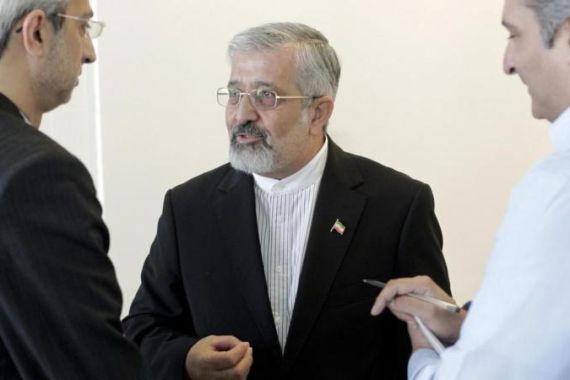Iran currency hits record low against dollar
Traders say more than 25,000 rials needed to buy one US dollar, as IAEA chief “frustrated” by lack of progress in talks.

Street traders in Iran say the country’s currency has struck a new record low against the US dollar, the second consecutive day it has fallen sharply.
They say the rial on Monday dropped some five per cent, with 25,650 rials now needed to purchase one dollar. A day earlier it fell nearly seven per cent.
The currency’s slide is a sign Western sanctions over Iran’s nuclear programme are biting, although Iran says it has enough reserves and blames nervous markets.
The West suspects Iran aims to build nuclear weapons but Iran denies that.
On July 1, the European Union banned import of Iranian oil, and the US tightened sanctions against Iran’s banks.
The current official rate is 12,260 rials to the dollar, used only for special purposes such as importing food and medicine.
Oil sales talks
Meanwhile, Iran is in talks to sell crude oil to Egypt, Iranian Oil Minister Rostam Qasemi was quoted as saying by the Iranian Students’ News Agency (ISNA) on Monday.
Iran has been looking for new buyers for its oil as sanctions squeeze sales to long-time customers.
Iranian officials have said on several occasions over the last few months they are in talks to sell oil to new customers, but rarely name them and there is little evidence of significant volumes of oil being shipped to new customers.
A spokesperson for Egypt’s oil ministry had no immediate comment on Qasemi’s reported remarks but referred questions
about Iran’s policy back to Tehran.
Diplomatic relations between Tehran and Cairo broke down after Iran’s 1979 Islamic revolution over Egypt’s support for the overthrown Shah and its peace agreement with Iran’s arch-enemy Israel.
Since the fall of President Hosni Mubarak, there have been some signs of warming relations, including Egyptian President Mohamed Morsi last month making the first visit to Tehran by an Egyptian leader in more than 30 years.
Egyptian Petroleum Minister Osama Kamal told state owned Al-Ahram newspaper earlier this month that Cairo had “no
objection” to importing Iranian crude and processing it in Egyptian refineries.
IAEA chief ‘frustrated’
The head of the UN atomic agency hit out on Monday at Iran’s refusal to grant access to sites and scientists involved in suspected nuclear weapons research.
International Atomic Energy Agency chief Yukiya Amano called on Iran to open up “without further delay” the Parchin military site where “powerful tools” could detect traces of covert activities despite Tehran’s suspected clean-up work.
Speaking at the start of an IAEA board of governors meeting where Western nations want Tehran censured, Amano said that in a string of meetings and visits to Iran this year, the two sides had been “going round in circles”.
“This is frustrating because, without Iran’s full engagement, we will not be able to start the process to resolve all outstanding issues, including those involving possible military dimensions to its nuclear programme,” he said.
Iran has continued to expand its enrichment of uranium, which can be used for peaceful purposes but also in a nuclear weapon, despite multiple UN Security Council resolutions calling for an immediate suspension.
Israel, the Middle East’s sole if undeclared nuclear-armed state, has refused to rule out an military action, and media speculation has heightened considerably in recent weeks that such a strike might be imminent.
The IAEA’s latest report on Iran last month said it had doubled enrichment capacity at its Fordo facility, a site dug into a mountain near the holy city of Qom and seen therefore as difficult to destroy.
The centrifuges currently in operation at Fordo – the number of which has not increased – are used to enrich uranium to a purity of 20 per cent, a short step from producing the 90 per cent material needed for a bomb.
No US deadline
The US is not imposing a deadline on Iran as it seeks to persuade the Islamic republic to rein in its nuclear programme, US Secretary of State Hillary Clinton said on Sunday.
|
“Iran will not stop unless it sees clear determination by the democratic countries of the world and a clear red line“ – Binyamin Netanyahu, |
“I think we’ve maintained a steady course of our two-pronged policy,” Clinton told Bloomberg radio Sunday at the end of a trip to Asia.
“We have always said every option was on the table, but we believe in the negotiation, the diplomatic effort through the P5+1, but also pressure,” she added in the remarks released on Monday.
The five permanent members of the UN Security Council – Britain, China, France, Russia and the United States – will meet in New York in the coming weeks on the sidelines of the UN General Assembly, she said.
“We’re not setting deadlines. We’re watching very carefully about what they do, because it’s always been more about their actions and their words,” Clinton said in the interview in the Vladivostok where she was attending an Asia-Pacific talks.
Israeli Prime Minister Binyamin Netanyahu has meanwhile told Canada’s CBC that his country is talking with Washington about laying down “clear red lines” for Iran.
“Iran will not stop unless it sees clear determination by the democratic countries of the world and a clear red line,” Netanyahu told CBC.
“The sooner we establish one, the greater the chances that there won’t be a need for other types of action,” he said.